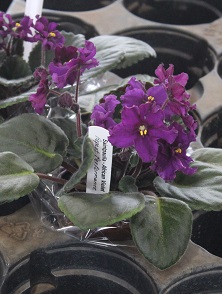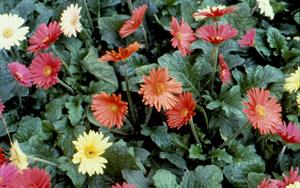Train in Wholesale Nursery Management from your own home by Distance Learning.
- Gain a thorough introduction to the management of wholesale nurseries.
Managing a production nursery involves more than just propagating and potting up plants. Even the small nursery must be able to not only produce plants, but do it at a pre determined cost, and then sustain those plants before and during marketing and selling.
The nursery industry currently has a real need for people with skills and knowledge in managing production plant nurseries! This course provides a solid grounding for developing those skills.
COURSE STRUCTURE AND CONTENT
This subject involves eight lessons as follows:
Lesson 1. Nursery Site Organisation
- Selecting the site (e.g. Buying an established nursery or establishing a new site).
- Determining facilities needed.
- Site planning.
- Estimating space requirements.
Lesson 2. Management
- Public and Commercial nurseries.
- Management Options; Partnerships, companies, sole proprietorships.
- Developing a management structure.
- Labour relations and seasonal staff.
- Work programs and production timing.
Lesson 3. Nutrition and Pest Management
- Field crops.
- Container plants.
- Principles of fertiliser use.
- Plant nutrition.
Lesson 4. Growing Media
- Soils and soil-free mixes.
- Rockwool.
- Sterilisation techniques.
Lesson 5. Irrigation Management for Production Nurseries
- Methods and equipment.
- Estimation of water requirements.
- Use of liquid fertilisers through irrigation.
Lesson 6. Modifying Plant Growth
- Growth modification techniques.
- Flower forcing.
- Quality control.
Lesson 7. Nursery Marketing Strategies
- Exploiting existing markets.Developing new markets.
- Advertising.
- Product presentation.
- Pricing.
- Plant recycling.
Lesson 8. Selection of Nursery Crops
- Developing a stock list.
- Operational flow charts.
- Market surveys.
COURSE AIMS
- Describe how site characteristics influence the establishment and management of wholesale nurseries.
- Explain management structures and work scheduling in wholesale nurseries.
- Describe the management of pests and diseases and plant nutrition in production nurseries.
- Explain the physical and chemical properties of growing media used in production nurseries.
- Describe the techniques and equipment used to irrigate plants in nurseries.
- Explain techniques used to modify and influence the growth of plants in production nurseries.
- Describe strategies used by production nurseries to increase sales.
TYPES OF NURSERIES

In the past, nurseries were involved in almost all aspects of the production and culture of plants. They grew a wide variety of plants, and they sold them both wholesale and retail, as well as supplying a wide range of allied products and services. Today all but the largest nurseries tend to specialise.
Nurseries can be public (for example, run by government, community or conservation groups) or private enterprises. Private nurseries may be individually owned partnerships (perhaps owned by a husband and wife or two friends), or corporate, such as a company, where they have a legal identity of their own.
Some nurseries are focused on producing plants, and others retailing. Some do both, but most do not.
This course is relevant to any type of production nursery, whether public or private, whether propagation or growing on
Nurseries which try to do everything rarely succeed. New nurseries should consider the following options carefully and define the scope of their operation to fit their resources, skills and knowledge.
Production Nurseries
Production nurseries, also known as propagation or wholesale nurseries, propagate plants and either sell them direct to retail outlets, landscapers and council parks departments, or wholesale them to growing-on nurseries. Success of production nurseries is affected by:
- Innovation – supplying new varieties to the market or developing new ways of growing and presenting existing varieties allows the grower to develop new markets.
- Specialisation – growing fewer lines in larger quantities allows the grower to improve efficiencies in the nursery.
- Forecasting trends and meeting market demands – knowing what plants customers want, or are likely to want, and growing them in sufficient quantities allows the grower to meet consumers’ requirements, and through doing this, maintaining customer loyalty.
Growing-on Nurseries
Growing-on nurseries buy bulk quantities of seedlings or small plants from propagators. At the time of purchase, the plants are growing in plugs, trays or tubes; the plants are then potted into larger containers and grown on for a period of time, adding value to the nursery’s original purchase.

In addition to increasing the plants’ size, specialised growing techniques, such as topiary, may be used to add value to the plant during the growing-on phase.
In addition to increasing the plants’ size, specialised growing techniques, such as topiary, may be used to add value to the plant during the growing-on phase.
The most critical aspect of production in growing-on nurseries is developing a quality product for the retail market. At the time of resale, every plant must be at its peak, displaying healthy, vigorous and sturdy growth. The plant is commonly presented appropriately, in a clean, attractive pot, with fresh potting mix (no weeds or residues on the surface) and appropriate support (small stake or trellis) if necessary. Labels may also be supplied.
Area of the Nursery Site
The amount of land required for successful operation can vary from 0.1 hectare (1/4 acre) up to hundreds of hectares. The amount of land you acquire may depend on the following:
- Cost of land – You may have to compromise your ideals for what you can afford.
- Availability of land – You may be unable to get the exact size you want. For example, if you need a 1 hectare (2.5 acre) lot, land might only be selling in 2 hectare (5 acre) lots in your preferred locality.
- Spacing and size of plants – Consider the final pot size prior to sale and the space required between plants.
- The proposed output of plants – You will need to estimate the maximum numbers of plants in the nursery at any one time.
- Space required - for buildings, storage areas, roads, paths, car parks, dams, waste management facilities.
There are viable commercial nurseries operating out of backyards with as little as 400 square metres of space devoted to plants. Some of these backyard businesses generate enough income to support a family, but good management is particularly critical for businesses where space is at a premium. Many of the largest nurseries started out as small backyard operations.
Propagation nurseries and tissue culture operations generally require less space because the plants don't take up much room and they don't need to be kept and grown on for long before they are sold. There are a large number of plants produced with respect to space used in these nurseries, and a high income per unit area. Nurseries which deal with very valuable collectors plants (such as rare plants, bonsai, carnivorous plants and orchids) may also require less space than other nurseries because they are able to generate more money per plant.
Retail nurseries can vary in size from a small shop in a suburban shopping centre up to a large regional garden centre that may be five or more hectares in size. Retail nurseries with a fast turnover of plants need less space because they don't need room to hold or store plants for lengthy periods between sales.
Advanced plant nurseries generally require considerable space as plants can be grown for years either in containers or in-ground before being sold. Nurseries that grow grafted plants or advanced trees in field rows will require at least one hectare of land as a minimum to be a viable operation.
The Benefits of Studying This Course
Those who study this course will come away with all they need to know about setting up and running a nursery to make it financially viable. Lots of people can grow plants, but they won't all make it at a business level. That's where this course comes into its own. Study it by itself or as part of a higher level qualification. This course is most relevant to people working in the following areas:
- Nursery and propagation.
- Market gardening.
- Crop production.
- Hydroponics.
- General horticulture
PLAN YOUR CAREER - PLAN YOUR BUSINESS, STUDY WITH ACS
Enrolling is easy - just go to the box at the top right-hand side of this page.
If you have any questions, or need help
in choosing the right course for you please do get in touch with us - get in touch with our expert Horticulture tutors today!